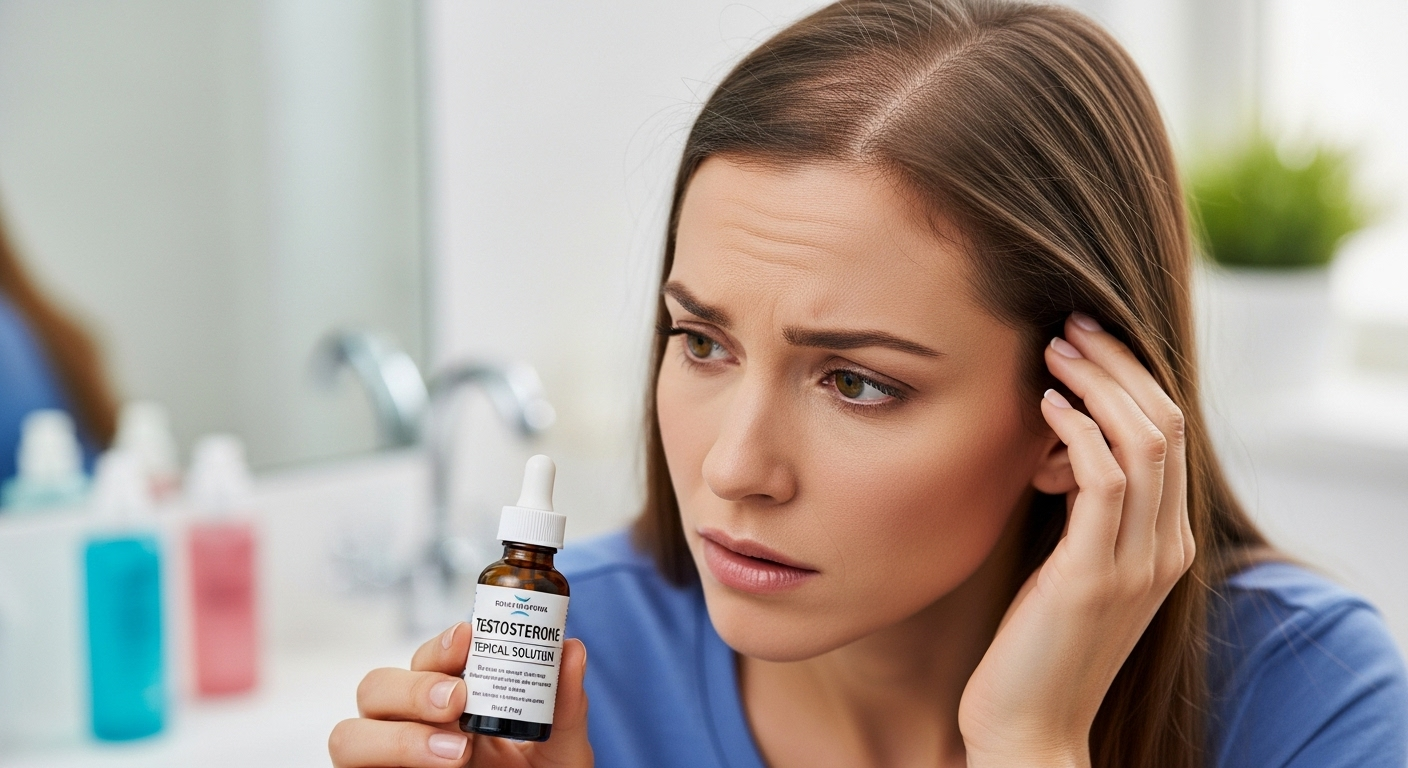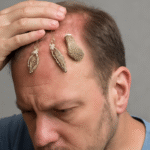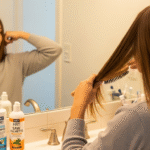Female hair loss can be a troubling and frustrating experience, often leading many to search for effective treatments. One potential solution that has garnered attention is testosterone therapy. But Will Testosterone Help with Hair Loss in Females? In this article, we will delve into how testosterone affects hair loss, its potential benefits, and whether it's …
Female hair loss can be a troubling and frustrating experience, often leading many to search for effective treatments. One potential solution that has garnered attention is testosterone therapy.
But Will Testosterone Help with Hair Loss in Females? In this article, we will delve into how testosterone affects hair loss, its potential benefits, and whether it’s the right choice for you.
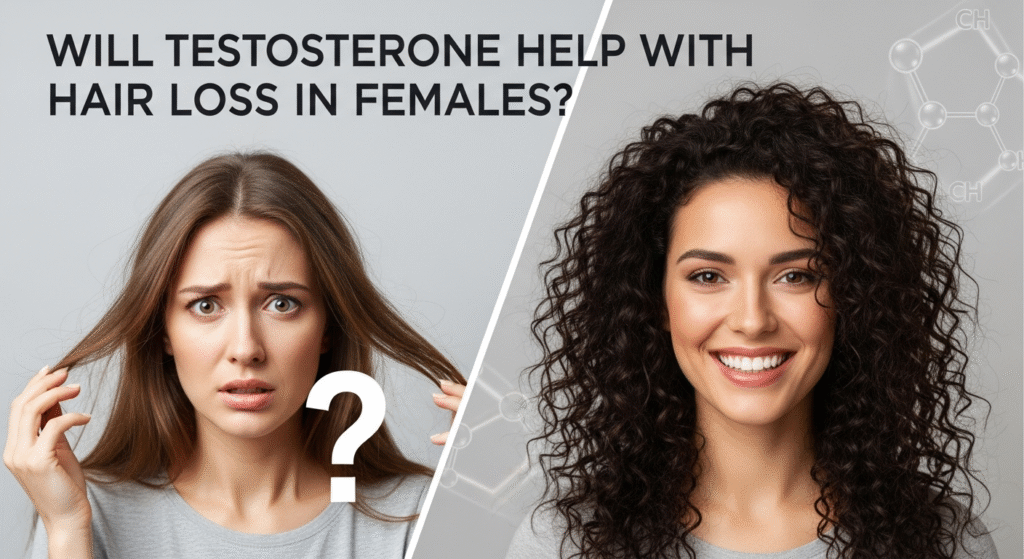
Understanding Will Testosterone Help with Hair Loss in Females
Hair loss in women can occur for various reasons, but one of the most common causes is hormonal imbalance. Factors such as genetics, menopause, pregnancy, and certain medical conditions can lead to hormonal fluctuations, affecting hair growth. Testosterone, typically known as a male hormone, also plays a significant role in the hair growth cycle for females.
What Causes Hair Loss in Women?
Hair loss in women can be triggered by several factors, including:
- Genetic Predisposition (Androgenic Alopecia): This is the most common cause of female hair loss and is often linked to family history.
- Hormonal Changes: Hormonal fluctuations during pregnancy, menopause, or conditions like polycystic ovary syndrome (PCOS) can lead to hair thinning.
- Stress and Trauma: Emotional or physical stress can trigger temporary hair loss.
- Nutritional Deficiencies: A lack of vital nutrients like iron or biotin can contribute to thinning hair.
The Role of Hormones in Hair Growth
Hormones have a profound impact on the hair growth cycle. Estrogen and progesterone promote hair growth, while an excess of androgens (male hormones like testosterone) can cause hair thinning and hair loss, especially in women predisposed to androgenic alopecia.
How Does Testosterone Affect Hair Loss in Women?
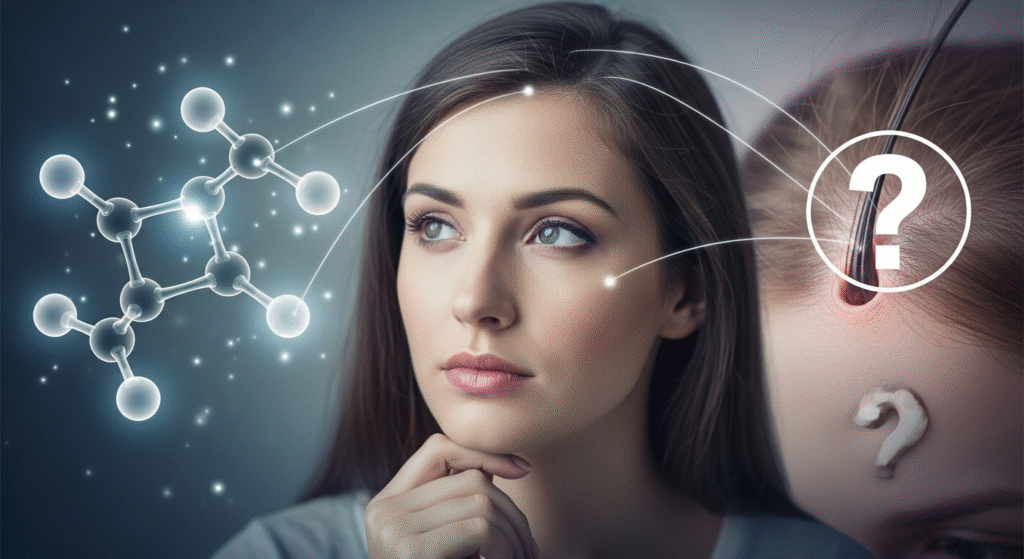
While testosterone is often associated with male characteristics, it also plays a crucial role in female health. Elevated levels of testosterone can contribute to hair loss, but in some cases, regulated testosterone therapy may actually help stimulate hair growth.
Testosterone and Androgenic Alopecia in Women
Testosterone’s impact on hair loss in women is primarily seen in androgenic alopecia, which is a genetic condition often referred to as female-pattern baldness. When testosterone is present in high levels, it can convert into dihydrotestosterone (DHT), a potent hormone that shrinks hair follicles and leads to hair thinning.
Can Testosterone Improve Hair Growth?
Some studies suggest that testosterone therapy, in specific cases, may stimulate hair growth in women suffering from hair thinning due to low androgen levels. By restoring the right balance of hormones, testosterone may help to promote healthier hair follicles and new hair growth.
However, this therapy should be carefully administered and closely monitored by a healthcare professional. Testosterone treatment may be more beneficial for women experiencing hair loss due to an androgen imbalance rather than those suffering from other forms of hair loss.
Risks of Testosterone for Female Hair Health
Despite its potential benefits, testosterone therapy comes with risks. Elevated testosterone levels can cause unwanted side effects, such as:
- Increased facial hair growth: Testosterone can cause women to develop more facial hair, especially on the chin and upper lip.
- Scalp acne: High testosterone levels may increase oil production, leading to acne on the scalp.
- Deepening of the voice: This is a rare side effect, but it can occur with long-term use of testosterone therapy.
As with any medical treatment, it is essential to consult with a healthcare professional before starting testosterone therapy.
Testosterone Therapy for Hair Loss: What You Need to Know
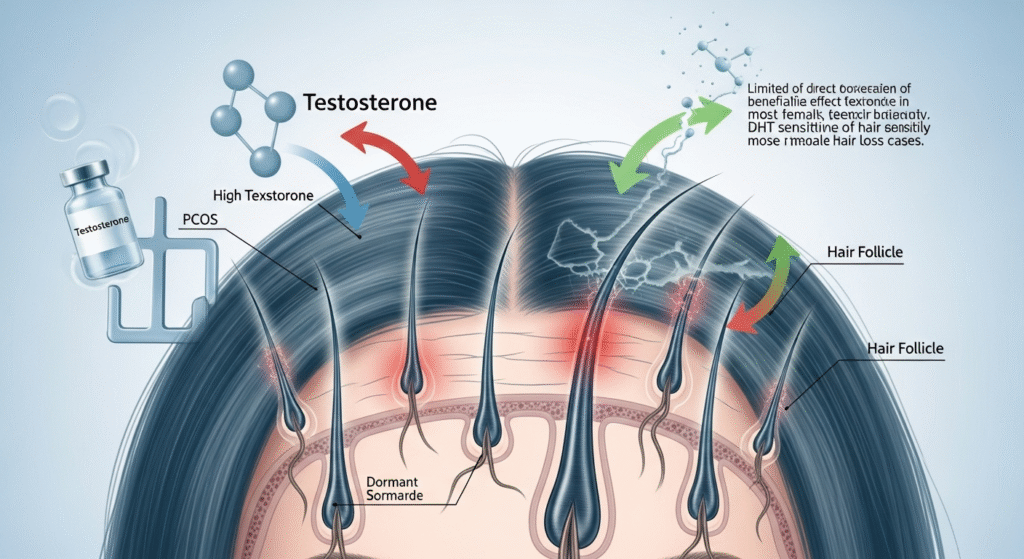
Testosterone therapy can be administered in several forms, including oral medications, topical treatments, and injections. Each method has its pros and cons, and the best option depends on individual needs and preferences.
Different Forms of Testosterone Treatment
- Oral Supplements: These are commonly prescribed but may have a higher risk of side effects due to systemic absorption.
- Topical Treatments: Applied directly to the scalp, these treatments are more localized and may carry fewer side effects.
- Injections: Testosterone can also be administered through injections, often offering more controlled results.
Effectiveness of Testosterone Therapy for Female Hair Loss
The effectiveness of testosterone therapy varies depending on the individual’s hormone levels and the cause of hair loss. Women with low testosterone may see improvements in hair thickness and volume, while those with excess testosterone may experience worsening symptoms.
How to Safely Use Testosterone for Hair Loss
If considering testosterone therapy, it is essential to undergo a thorough evaluation by a healthcare professional. This includes hormone level testing and discussions about potential risks and benefits. A tailored treatment plan, including regular follow-ups, will ensure the best results with minimal side effects.
Case Studies and Real-Life Experiences
Success Stories: Women Who Used Testosterone for Hair Loss
Several women have reported positive outcomes from testosterone therapy, especially those who had androgenic alopecia linked to hormonal imbalance. Success stories often include significant improvements in hair density and regrowth after several months of treatment.
However, these results can vary, and what works for one person may not be effective for another. It’s crucial to assess individual needs before committing to any treatment plan.
Should You Consider Testosterone for Hair Loss?
Testosterone therapy can be an effective solution for women experiencing hair loss due to hormonal imbalances, particularly those with androgenic alopecia. However, it’s not without risks, and it’s essential to work closely with a healthcare provider to determine if it’s the right treatment option for you.
Pros and Cons of Testosterone for Hair Loss in Women
- Pros:
- May stimulate hair growth in women with low androgen levels.
- Can help restore hair density in certain cases of androgenic alopecia.
- Cons:
- Potential for unwanted side effects like facial hair growth.
- Requires close medical supervision and regular checkups.
How to Talk to Your Doctor About Testosterone for Hair Loss
If you’re considering testosterone therapy for hair loss, discuss your symptoms and medical history with your healthcare provider. Together, you can determine if this treatment is right for you and create a plan that ensures safety and effectiveness.
FAQs
Is testosterone the only solution for female hair loss?
Testosterone therapy is one option, but there are other treatments available, including minoxidil, hair transplants, and lifestyle changes.
What other treatments are available for hormonal hair loss in women?
Other treatments include anti-androgens like spironolactone, which can block testosterone’s effects on hair follicles.
Can testosterone therapy cause unwanted side effects for women?
Yes, potential side effects include increased facial hair growth, scalp acne, and changes in voice pitch. Always consult a doctor before starting therapy.
How long does it take for testosterone therapy to work for hair growth?
Results can take several months to become noticeable, and ongoing monitoring is essential to ensure the therapy is working as intended.
Book a Consultation with Our Specialist
If you’re struggling with hair loss and think testosterone therapy might be right for you, book a consultation with Dr. Uzma Irfan, an ISHRS-certified surgeon, today. Get expert advice on hormone treatments and discover the best solutions tailored to your needs.

